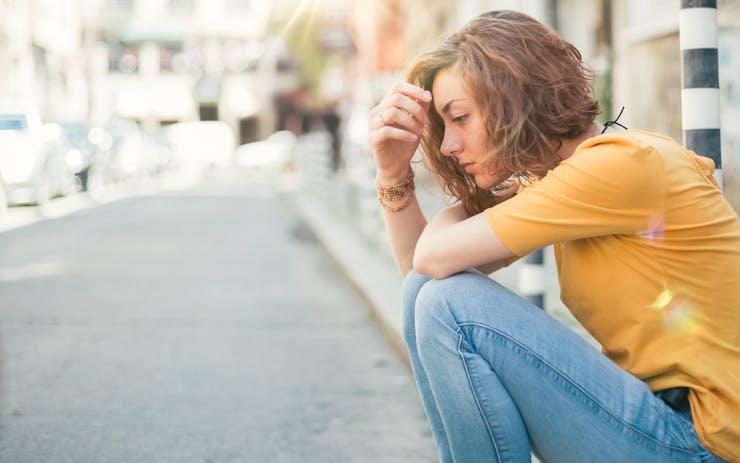Throughout its prohibition, cannabis has been considered a self-medicated “coping” drug, especially in individuals with anxiety disorders like post-traumatic stress disorder, or PTSD. Government funded studies examining the link between cannabis and PTSD frequently use the term “marijuana abuse disorder,” a co-occurring problem in need of rehabilitation.
There is overwhelming evidence that PTSD and cannabis go hand-in-hand. But while most studies point out the prevalence of marijuana abuse among PTSD patients, a minority of emerging research is looking at the question in reverse: could cannabis be effectively treating PTSD?
Living with PTSD
PTSD, or post-traumatic stress disorder, is an anxiety condition caused by disturbing episodes, such as military combat or sexual assault. Three classes of symptoms characterize PTSD: re-experiencing, avoidance, and hyper arousal (e.g., flashbacks, social isolation, insomnia). The persistence of PTSD over time is attributed to changes in brain chemistry that occur at the time of the trauma, when adrenaline and stress hormones are hyper-responsive.
Since age nine, Ben Nichols has experienced debilitating PTSD symptoms, and with it came a tangle of other issues like insomnia and ADD. Ben takes Adderall to help with concentration difficulties caused by PTSD, but turns to cannabis to treat the anxiety.
“It helps with daily tasks like school, work, and relationships,” Ben said. “My mind races and cannabis helps me slow down and think through the trauma rather than hide from it. I can tell it’s helping me because my sleeping patterns are normal and I don’t have anxiety attacks.”
Ben is fortunate to live in a state with legal medical cannabis, but not all PTSD sufferers have access to its unprecedented relief. Combat veterans have an especially high propensity for PTSD, and statistics show that about 1 in 5 military personnel deployed in Iraq and Afghanistan experience it. Given cannabis’ federally prohibited status, veterans are instead steered toward antidepressants and antipsychotics, medications that have had very little success in treating severe PTSD symptoms.
“The drugs that they were giving them … they couldn’t get up in the mornings,” said Army first sergeant Gregory Westbrook. “Most of the guys weren’t the type of soldiers who had issues before Iraq or even in Iraq, but they bring them back and put them on these drugs, and they’re falling asleep in the chair. There was no way they could function, especially in a civilian job. So maybe marijuana is an alternative.”
How Cannabis Can Help Treat PTSD
Currently there are no specialized, effective medications available for PTSD patients, but with new discoveries in our body’s therapeutic hotspot — the endocannabinoid system — research is beginning to pave new avenues of understanding and treating PTSD.
One investigator of PTSD and cannabis is the Multidisciplinary Association for Psychedelic Studies (MAPS). Martin Lee is a MAPS affiliate and director of Project CBD, and has studied PTSD and cannabinoids in depth.
Shop highly rated dispensaries near you
Showing you dispensaries near“Researchers found that people with PTSD had lower levels of anandamide, an endogenous cannabinoid compound, compared to those who did not show signs of PTSD,” Lee wrote, “Innate to all mammals, anandamide (our inner cannabis, so to speak) triggers the same receptors that are activated by THC and other components of the marijuana plant.”
In other words, one pillar of PTSD is an endocannabinoid deficiency: the body stops producing enough endocannabinoids to fill receptor sites, and this is where the cannabinoids found in marijuana play a therapeutic role. By replenishing these missing endocannabinoids with those found in cannabis, researchers think marijuana pharmaceuticals might bring PTSD patients relief from their memories.
“Scientists have determined that normal CB-1 receptor signaling deactivates traumatic memories and endows it with the gift of forgetting,” Lee said, “But skewed CB-1 signaling, due to endocannabinoid deficits (low serum levels of anandamide), results in impaired fear extinction, aversive memory consolidation, and chronic anxiety, the hallmarks of PTSD.”
Accessing Medical Marijuana for PTSD
PTSD patients are advised to first consult a medical professional before treating symptoms with cannabis. Consumers unaccustomed to marijuana may find that THC aggravates anxiety symptoms. Cannabidiol, better known as CBD, is a marijuana cannabinoid that counteracts some of THC’s effects, including paranoia and anxiety. Further research examining the relationship between THC and CBD could lead to more tolerable variants of cannabis pharmaceuticals for high anxiety individuals.
The damage caused by PTSD cannot be fully unraveled by any medication, but for some, cannabis provides respite when nothing else can. Despite a strong need for development of more effective medication without adverse side effects, the promising pharmaceutical possibilities in cannabis are continually dismissed by government-backed research organizations. However, forward momentum builds as education about cannabis’ healing properties spreads.
photo credit: johnwilliamsphd via photopincc





